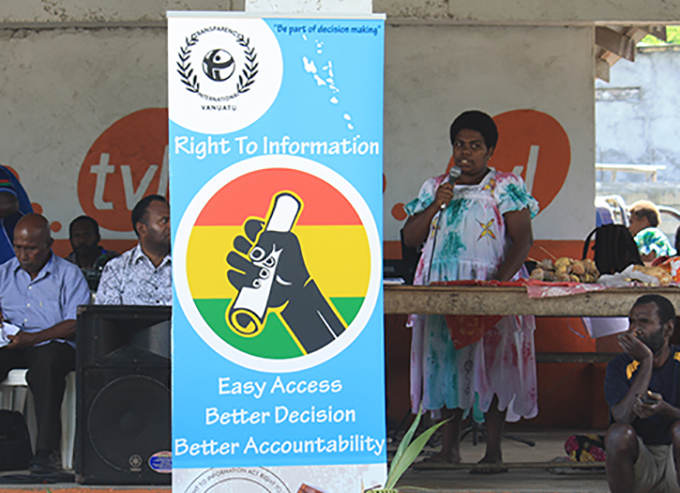
By Jane Joshua in Port Vila
Vanuatu’s Right To Information (RTI) Act has become law after it was published in the official Gazette, less than three months after it was unanimously endorsed by Parliament.
This law gives effect to the right of freedom of expression under paragraph 5 (1) (G) of the Constitution and applies to information held by a government agency or a relevant private entity on or after July 30, 1980.
But access to information, either by individuals or the media, is not free.
The RTI legislation stipulates that the minister responsible will prescribe a fee referred to as the reproduction fee.
This fee is payable by an applicant upon being given a grant of access to information by a government agency, relevant private entity or private entity.
At this stage, no specific reproduction fee has yet been determined but the RTI law has put a threshold of Vt50,000 (about NZ$615) stating, “Reproduction fees charged by a government agency, relevant private entity or private entity must not exceed Vt50,000”.
The Vanuatu Government has been lauded for advancing the historic bill in parliament but this of course, begs the question, will the specific reproduction fees be affordable to the people or is it going to be a financial barrier, making it harder for citizens of the country to access factual Government information?
Reproduction fee
On the positive side, an applicant is not required to pay a reproduction fee when lodging an application or in relation to the time spent by the RTI in searching for the information requested.
An applicant is also not required to pay a reproduction fee for the reproduction of personal information of the applicant, on behalf of another person involved, third party as guardian, deceased party and next of kin, for the reproduction of information which is on the public interest or if the RTI officer fails to comply with the time for responding to an application.
Prime Minister Charlot Salwai, as minister responsible for media, tabled the RTI bill during the 2016 2nd Extraordinary Session of Parliament.
He quoted the five indicators of effective information disclosure as:
- maximum disclosure,
- accessibility,
- affordability,
- effective implementation, and
- media and governance Relations.
The prime minister noted that information is power but it needed to be true information, and this legislation would stop hearsay.
‘Free flow’
PM Salwai also reiterated that the government made numerous commitments, both nationally and internationally over the years to improve transparency and accountability to include RTI and this “recognises the importance of providing a free flow of information on government programs and services to MPs, citizens, civil society and development partners”.
Under this law, if an application for information is made, a RTI officer must determine whether or not to grant the application within 30 days of receiving the application.
If an application relates to information that appears to be necessary to safeguard the life or liberty of a person, the RTI should make a determination on the application within 48 hours.
In the event where an application for access to information is denied, the applicant must be notified and the reasons for the refusal stated.
A RTI officer may defer access to information requested if: the information is a report that has been prepared for tabling in Parliament, the information constitutes a report that has been prepared for the purpose of reporting to an official or an official body or if the premature release of the record would be contrary to the public interest.
When considering an application for access to information in relation to personal information of a third party or commercial and confidential information of a third party, a RTI officer must take reasonable steps to inform the third party and state that the application for access to information may be for personal or commercial or confidential and state the name of the applicant.

No refusal
Nevertheless, a RTI officer must not refuse to communicate information requested if the information is already publicly available but may refuse to indicate whether or not it holds the information requested if to do so would involve a disclosure of the personal information of a third party.
This is applicable to information that is privileged from production in legal proceedings unless the person entitled to the privilege has waived it.
Information is not exempted from access under this Act merely on the basis of it being classified by the government agency, relevant private entity or private entity as confidential or given any other status to that effect.
Within six months from the commencement of this legislation, the minister responsible is required to specify the government agencies that this Act applies to.












































